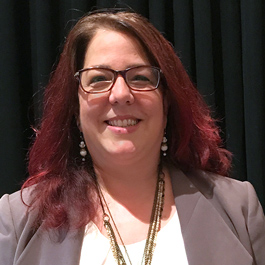
Associate Director of Communications for Climate Change Policy, North America
The Nature Conservancy
Communicating Environmental Issues
When talking of sustainability, people often mention energy efficiency, renewable energy, science, technology, and solar panels. But, another side of sustainability is convincing people to use LED light bulbs or businesses to put solar panels on their rooftops, and Liz Georges is here to do just that.
As the Associate Director of Communications in North America for Climate Change Policy at The Nature Conservancy, Georges promotes a transition to a low carbon future by promoting wider use of clean energy, energy innovation, policy, and other environmentally sustainable practices.
She feels these are important topics to discuss and vital to our future as a country. “We are seeing the rapid transformation of how we use, generate, transmit, and store electric power in this country,” says Georges. “This transition is well underway and is going to happen with or without us.”
Georges’ career in environmental communications was not a straight path. After earning her JD (Doctor of Jurisprudence) from Northwestern University Pritzker School of Law, Georges practiced at law firms for over four years, focusing mostly on environmental regulation and commercial litigation. These experiences confirmed her passion for environmental issues and lead her to become a voice promoting sustainability.
“The biggest link I’ve found between where I started and where I’ve landed has been the instinct and ability to persuade people towards certain outcomes,” says Georges. She explains that a good lawyer has to determine what outcome a client is working toward, and how to convince others to reach that result. Georges found that this skill set transitioned perfectly into her current role as a communicator, as her work requires her to drive a specific audience towards a particular way of acting or thinking.
"We are seeing the rapid transformation of how we use, generate, transmit, and store electric power in this country." — Liz Georges (Law '94), Associate Director of Communications in North America for Climate Change Policy at The Nature Conservancy
Most recently, Georges has put these skills to use working on “Choosing Clean Energy”—an initiative designed to promote storytelling on clean energy. These stories focus on not only why the transition to clean energy is beneficial climate wise, but also its positive impact on the economy, and the health and the well-being of our communities.
Additionally, she believes that her biggest career achievement so far has been helping create this new communications strategy at the Conservancy. “We are, as an organization, very bi-partisan but we have become a leader in helping to bring right leaning audiences to the table and promoting sustainable energy policy,” says Georges.
The communications work conducted by her and her team plays a major part in bringing diverse groups together in these conversations. Their research has helped create an understanding of how to talk to the general public about joining the clean energy revolution. “It’s exciting to be part of the transformation and to be a cheerleader for this transformation our economy is making,” says Georges.
Throughout her career, Georges has found herself with a more optimistic viewpoint on climate change than that of the general public. “When most people think about climate change they think it’s depressing and scary,” says Georges. However, she says, “The solutions are there. The issue is convincing the public and policymakers to implement the solutions, and I see a lot of hope out there.”
Editor's Note: Liz Georges is now Senior Director, Climate Communications at WWF.